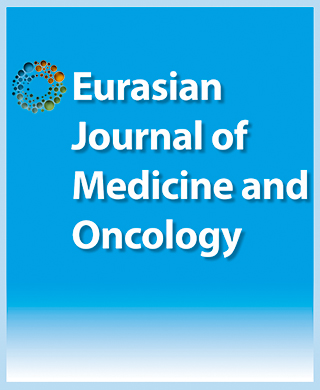

Baseline Pan-Immune-Inflammation Value is Associated with Clinical Outcome in Patients with Recurrent or Metastatic Head and Neck Cancer Treated with Immune Checkpoint Inhibitors
Zhen Su1, Jie Tang2, Wei Hua Zeng1, Yan Hergunsel1, Chen Yin1, Guo Rong Zou11Department of Oncology, Panyu Central Hospital, Cancer Institute of Panyu District, Guangzhou, China, 2Department of Oncology, Jinan University, Guangzhou, China,
Objectives: Immune checkpoint inhibitors (ICIs) have played an important role in the treatment of patients with recur rent or metastatic head and neck cancer (R/M HNC). However, we lack prognostic and predictive markers of ICIs in R/M HNC. In this study, we aimed to evaluate the prognostic and predictive markers of the anticancer effect of ICIs. Methods: Fifty-seven patients with R/M HNC treated with ICIs were included in this retrospective study. The base line pan-immune-inflammation value (PIV) was calculated as follows: (neutrophil count × platelet count × monocyte count)/lymphocyte count, with a cut off value of 940.27. Results: With a median follow-up of 12 months, the 1-year overall survival (OS) rates were significantly lower in the high PIV group compared with those in the low PIV group (OS: 40.0% vs. 73.1%, p=0.03). In the multivariate analyses, we observed that a high PIV was a significantly unfavorable predictor of OS (hazard ratio (HR) 2.52, 95% confidence interval (CI) 1.09–5.81, p=0.003). Conclusion: For R/M HNC, PIV is an independent survival predictor for the efficacy of ICIs. Novel intensified treatments are needed for the subgroup of patients with R/M HNC and a high PIV. Keywords: Immune checkpoint inhibitors, recurrent or metastatic head and neck cancer, pan-immune-inflammation value
Cite This Article
Su Z, Tang J, Zeng W, Hergunsel Y, Yin C, Zou G. Baseline Pan-Immune-Inflammation Value is Associated with Clinical Outcome in Patients with Recurrent or Metastatic Head and Neck Cancer Treated with Immune Checkpoint Inhibitors. EJMO. 2024; 8(1): 24-31
Corresponding Author: Guo Rong Zou



